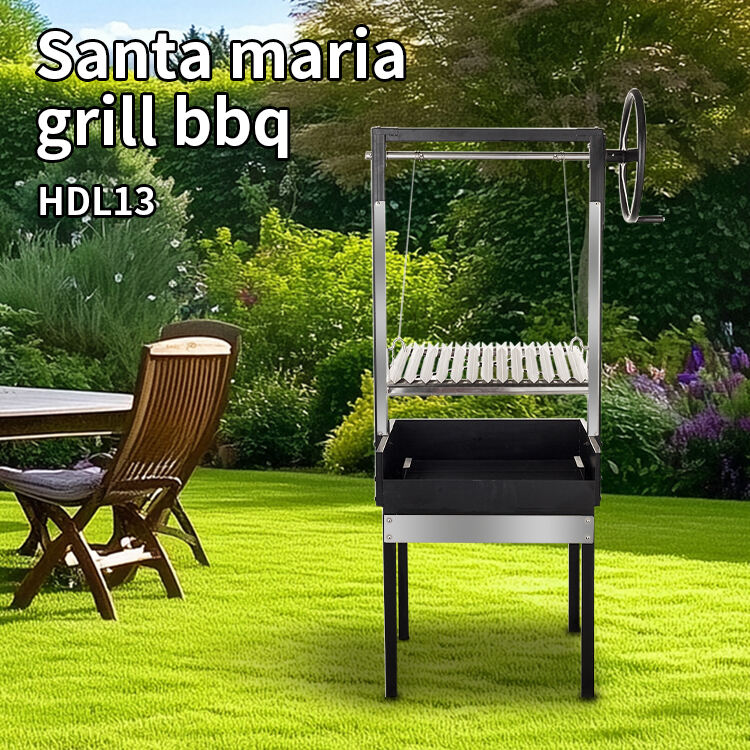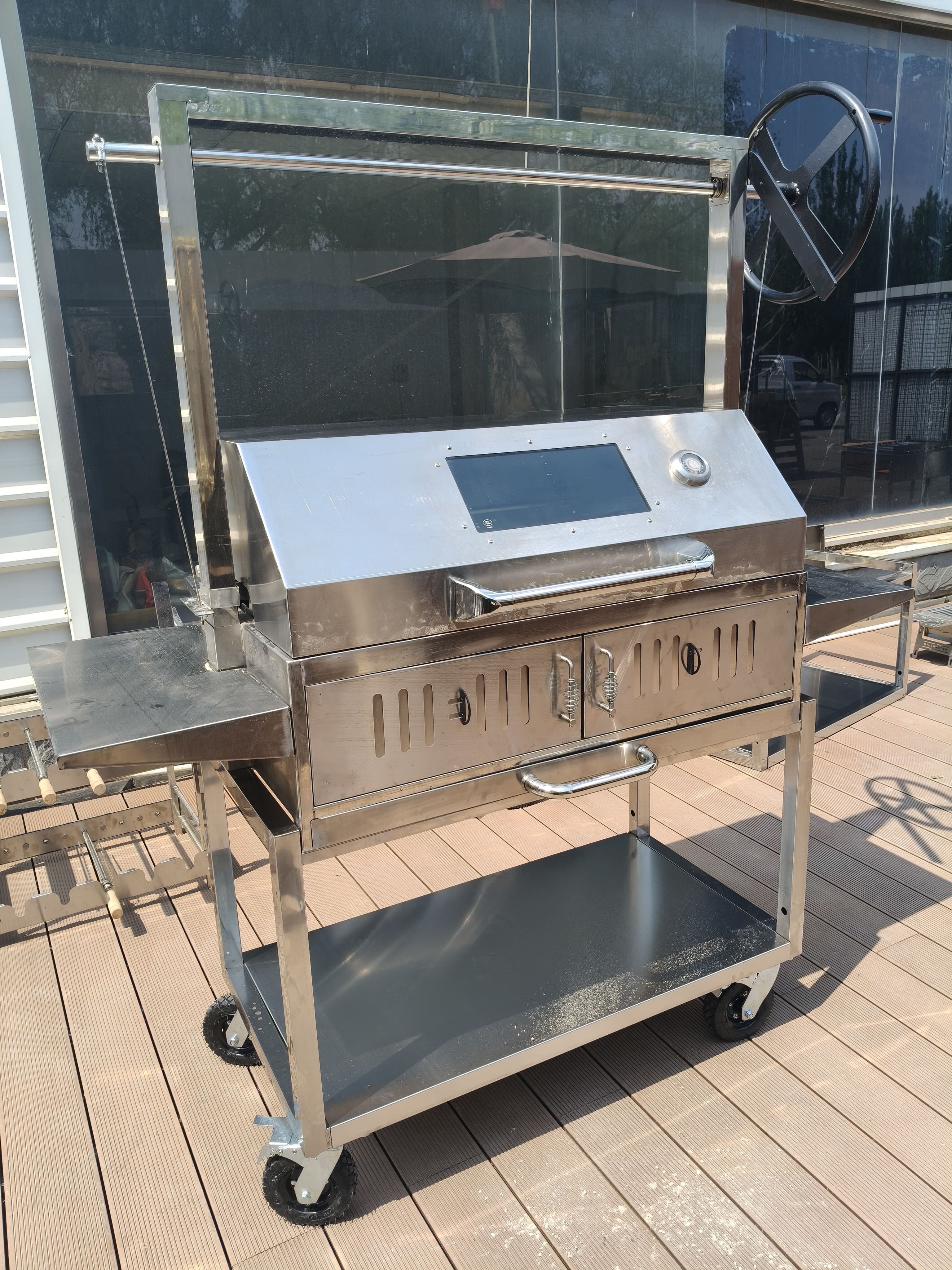Faktor Utama untuk Grill Pilihan
Menilai Ruang dan Kapasiti Tetamu Anda
Saiz Ruang dan Bilangan Tetamu Saiz ruang anda dan bilangan tetamu yang anda pelan untuk hiburan semasa mempertimbangkan pemanggang. Pertama, pertimbangkan saiz ruang luar atau dalam di mana pemanggang akan digunakan, dan pastikan terdapat ruang yang mencukupi untuk menggunakan pemanggang dengan selamat. Ciri ini memberikan ruang kepala yang mencukupi untuk memindahkan makanan anda di atas semasa memanggang. Selain itu, fikirkan juga bilangan tetamu yang anda biasa hiburnya. Jika anda biasanya menganjurkan majlis besar, anda mungkin lebih suka pemanggang yang mempunyai lebih banyak BTU supaya boleh memasak beberapa item pada masa yang sama. Ia penting untuk menyuai saiz pemanggang anda dengan tata letak ruang anda supaya segalanya berfungsi dengan betul dan tetamu anda gembira.
Kemudahan Membawa Bertentangan dengan Penyediaan Tetap
Samada grill mudah alih atau susunan kekal adalah yang terbaik untuk anda memerlukan keseimbangan yang halus antara fleksibiliti dan kestabilan. Mudah Alih Jika anda suka membuat tailgate atau pergi kempen, grill mudah alih mungkin pilihan yang baik kerana ia boleh dipindahkan. Tetapi juga pertimbangkan saiz dan beratnya, anda mahu sesuatu yang senang dibawa bersama, jadi sesuatu yang lebih ringan. Namun, perlu diperhatikan bahawa beberapa ciri yang dimiliki oleh model-model yang lebih berat dan jauh mungkin tidak didapati dalam grill yang sangat ringan. Sebaliknya, grill kekal adalah sempurna untuk mereka yang mahu dapur luar dengan griller binaan. Biasanya, grill ini boleh dibuat daripada bahan yang lebih kukuh, seperti keluli Stainless yang berat, untuk pilihan memasak di rumah yang bertahan lama. Pilihan anda harus berdasarkan kepada cara anda menjalani hidup dan berapa kerap anda menggunakan grill.
Jenis Bahan Bakar dan Profile Rasa
Grill Arang: Rasa Asap Autentik
Panggangan Arang dipuji kerana rasa asap yang diberikannya, berkat kayu keras semulajadi. Jenis arang yang anda gunakan juga akan membuat perbezaan besar kepada rasa dan kualiti memasak anda. Briquettes memberikan haba yang seragam dan pembakaran yang stabil, yang berguna untuk memasak berterusan, manakala arang gumpal, yang dibuat daripada kayu sebenar, memberikan rasa asap yang lebih kaya dan penuh. Memanggang dengan arang boleh menjadi cabaran untuk dikuasai - terutama dalam mendapatkan arang untuk menyala dan suhu untuk kekal sama. Latih hingga anda menjadi pandai memanggang dan boleh menghasilkan pengalaman yang jujur dan sedap.
Panggangan Gas: Kepadaan Bertemu Konsistensi
Panggung Gas- Untuk Memasak Dengan Mudah Tanpa Ribet Panggung Gas adalah pilihan yang paling sesuai untuk digunakan di halaman belakang rumah atau ketika anda memanggang jauh dari rumah. Ia menghasilkan haba seketika, yang sangat baik untuk pemula atau orang yang memerlukan sedikit bantuan untuk menyediakan makan malam di atas meja. Kawalan suhu akan mudah pada panggung gas, jadi anda boleh membuat penyesuaian kecil yang diperlukan semasa memasak. Sumber bahan api untuk panggung gas adalah propana, yang tangki-tangkinya boleh dipindahkan, dan gas asli, yang boleh disambungkan kepada saluran rumah untuk penghantaran bahan bakar terus. Kepada kerennya inilah sebabnya panggung gas adalah pilihan yang realistik untuk barbekyu yang mudah.
Pilihan Hybrid: Menggabungkan Sumber Bahan Bakar
Panggangan hybrid menggabungkan keversailan gas dan arang, memberi anda yang terbaik dari kedua dunia. Dengan panggangan ini, anda dapat menjadi selepasakan makanan sebanyak yang anda inginkan; anda mempunyai kebebasan untuk membuat gabungan rasa tanpa hujung; dan, kemampuan untuk memasak panas dan cepat atau rendah dan perlahan. Sistem memasak dua bahan bakar membolehkan anda mencuba masakan anda dengan gas atau arang atau kedua-duanya, sementara penyulutan gas pantas mendapat panggangan anda berjalan dengan pantas, dengan arang memberikan penyelesaian asap. Tetapi kadang-kadang mereka boleh sukar untuk dioperasikan, memerlukan pembelian kelengkapan tambahan dan mesti dirawat dengan baik. Bagaimanapun, panggangan hybrid mencipta peluang untuk pengalaman panggangan yang lebih besar dan seni kuliner.
Pilihan Bahan untuk Kekal Abadi
Keluli Tidak Berkarat: Juara Tahan Karat
Bahan terbaik untuk grill adalah keluli tahan karat, yang paling tidak mungkin mengalami kerosakan. Ia sangat dicari kerana kekokohannya dan ketahanannya terhadap karat seperti keluli tahan karat, dengan proses pembersihan yang mudah, dan ini sempurna untuk peralatan memasak luaran. Mengetahui ukuran keluli tahan karat adalah sangat penting kerana semakin rendah ukurannya, semakin tebal dan kuat bahan yang akan anda dapatkan, dan itu bermaksud ia boleh menanggung suhu tinggi dan cuaca yang keras. 204000 _ Bagi mereka yang menyukai penampilan bersih dan keawetan keluli tahan karat, model ini adalah untuk anda. _ Grill keluli tahan karat tersedia dalam pelbagai saiz dari 30\" Party kami hingga model Pro 512 Inci 8-Penyala kami.
Keluli Tuang: Penguasaan Penyimpanan Haba
Penahanan haba bagi besi tuang adalah aset utamanya di atas grill, memegang suhu sisi api lebih lama untuk membakar daging dengan sempurna. Sebagai hasilnya, ia mampu menahan dan menyediakan haba secara merata supaya makanan dipanggang secara seragam dan pengalaman memanggang dinaikkan tahap. Ingatlah, bagaimanapun, jika seseorang ingin mendapat tahun-tahun penggunaan daripada griddle mereka, pemeliharaan dan perawatan rutin, seperti penyedapan dan membersihkan, adalah mustahak. Dalam perbandingan, walaupun lebih tahan lama, keluli tidak menahan haba sebaik besi tuang yang menjadikannya pilihan yang sangat baik untuk mereka yang menghendaki grill yang boleh mengeluarkan haba yang terdistribusi secara merata.
Menilai Bahan Grate
Selain permukaan grill, ketinggian dan suhu rak juga dapat mempengaruhi cara anda memanggang. Pilihan akan terdapat pada rak stainless steel, besi tempa, dan rak berlapis porcelain yang menawarkan faedah yang berbeza. Rak stainless steel adalah tahan lama dan mudah dibersihkan, manakala rak besi tempa menyimpan haba dengan baik dan meninggalkan tanda panggangan yang kekal lama. Pelapukan Teflon atau lain-lain lapisan anti lengket memudahkan pembersihan tetapi boleh rosak dengan penggunaan. Memahami bagaimana bahan-bahan ini mempengaruhi rasa, kelihatan tanda panggangan, dan pengalaman memanggang keseluruhan boleh membuat perbezaan besar dalam hasrat anda untuk meningkatkan kemahiran memanggang.
Ciri-ciri Utama untuk Panggangan Optimal
Mengoptimalkan pengalaman memanggang BBQ bermula dengan menggunakan mekanisme Grill yang boleh disesuaikan. Ciri-ciri ini menjadikannya sesuai untuk memasak pelbagai jenis makanan, kerana anda boleh meletakkan makanan pada jarak yang berbeza dari api, memastikan segala sesuatu dimasak seperti yang anda mahukan. Barbeque dengan pilihan ketinggian yang berbeza boleh membantu memastikan bahawa grill anda adalah pada ketinggian yang lebih selamat dan selesa untuk bekerja, yang tidak hanya dapat membantu mengurangkan kemungkinan terbalik (terutamanya apabila anak anda memutuskan bahawa ia adalah hari yang baik untuk membantu), tetapi juga boleh mengurangkan tekanan kepada badan anda serta memberikan pengalaman memasak yang lebih mudah dan selesa. Lelaki dan wanita yang gemar memanggang melakukannya kerana model-model dilengkapi dengan ciri-ciri ini sangat fleksibel, dan hal ini tercermin dalam ratusan ulasan yang sering menyertai penilaian tinggi. Memilih model dengan rak yang boleh disesuaikan ketinggiannya boleh meningkatkan pengalaman memanggang anda dan kualiti makanan anda.
Ciri sangat penting lain dari memanggang adalah termasuknya beberapa zon haba dan keupayaan untuk mengawal haba. Ini akan membolehkan anda memasak beberapa hidangan pada masa yang sama, setiap satu pada suhu optimum. Kawalan suhu juga membantu mengelakkan memasak terlalu masak, memastikan makanan anda lebih sedap, dan mungkin lebih baik untuk kesihatan berbanding beberapa hidangan yang terbakar yang dinikmati oleh kaedah memasak gua kuno! Penggoreng profesional sering menekankan keperluan untuk pengawalan haba yang baik dalam memasak di luar, ini akan menjadi cara yang hebat untuk memanggang daging yang sempurna untuk keluarga. Ini bermaksud bahawa pemanggang dengan kawalan suhu teknologi tinggi boleh menjadi perubahan besar dalam permainan memasak luaran anda.
Kemudian, fikirkan tentang permukaan rata dan susunan pasangan meja sisi serta penyimpanan tambahan pada pemanggang BBQ. Bukan hanya soal kelihatan baik sahaja, kerana elemen-elemen ini membantu memaksimumkan kecekapan dan susunan alam grilling anda. Meja sisi menawarkan ruang untuk bekerja atau melayani, jadi segalanya berada dalam jangkauan tangan. Penyimpanan yang mudah bermakna semua alat dan aksesori grilling anda berada di tempat yang diperlukan, dan rak sisi stainless steel binaan membuat tempat yang sempurna untuk mempersembahkan kemahiran kuliner anda. Ulasan pelanggan yang positif sentiasa berbincang tentang bagaimana ciri-ciri pengatur jaringan master ini mencipta pengalaman grilling yang mudah dan menyeronokkan yang menawarkan nilai besar kepada mana-mana jurutera luar.

Penyelenggaraan dan Ketahanan
Amalan Pembersihan Terbaik
Untuk mendapatkan penggunaan maksimal dari pemanggang anda dan memastikan ia memasak dan memanaskan dengan sebaik mungkin, penting untuk mengetahui cara membersihkan pemanggang. Mematuhi amalan terbaik, seperti menggosok rak secara rutin dengan sikat pemanggang dan menggunakan semburan pelindung, dapat membantu memperpanjang umur pemanggang anda. Untuk mengelakkan daripada merosakkan barbekyu anda, pastikan untuk mengikuti produk pembersih yang direka oleh pembuat pemanggang (sebahagian daripadanya mempunyai bahan kimia keras yang boleh menyebabkan kerosakan). Menariknya, menjaga pemanggang telah terbukti meningkatkan tempoh hidupnya sebanyak 20%. Ingatlah bahawa barbekyu anda akan bertahan lebih lama dan kecerahannya akan terpelihara jika dibersihkan selepas digunakan.
Melindungi Dari Elemen Cuaca
54. Memastikan panggangan anda selamat daripada cuaca akan memastikan jangka hayatnya lebih panjang. Perlu juga diberi perhatian untuk mencegah kerosakan akibat hujan, salji dan UV, adalah perlu untuk menutup panggangan apabila tidak digunakan. Panggangan dan kelengkapan yang direka menggunakan bahan tahan cuaca boleh menjadi langkah tambahan untuk melindunginya daripada elemen-elemen ini. Penyelidikan juga menekankan kepentingan untuk memastikan pemanggang Barbecue bebas daripada kerosakan cuaca. Apabila berusaha mencegah kakisan dan reput, anda akan dapat menikmati berpuluh-puluh tahun dengan panggangan penyerap haba yang sentiasa kelihatan sempurna.
Senarai Pemeriksaan Penyelenggaraan Musim
Menyelenggarakan pemanggang anda adalah isu utama untuk menjaganya dalam keadaan kerja terbaik. Membuat senarai penyelenggaraan yang merangkumi pemeriksaan saluran gas, membersihkan pembakar dan menukar bahagian jika berkenaan akan mengelakkan isu di masa hadapan. Tidak sahaja penyelenggaraan pra-musim membantu pemanggang bekerja dengan lebih baik, ia juga mengelakkan anda daripada perlu membuat baiki besar di tengah musim memanggang puncak. Penyelenggaraan rutin adalah faktor besar dalam mengecualikan baiki kos yang tinggi dan menjaga pemanggang beroperasi, kata pakar. Mengikuti senarai ini akan menjauhkan anda dari telefon dengan khidmat pelanggan dan menyelaras untuk menjadikan musim memanggang terbaik anda hingga kini!
S&A
Q: Apakah pertimbangan utama apabila memilih pemanggang?
A: Pertimbangkan ruang yang tersedia, kapasiti tetamu, keperluan portabiliti, dan jenis bahan api untuk pengalaman memasak yang diinginkan.
Q: Bagaimana bahan pemanggang mempengaruhi prestasi?
A: Bahan seperti keluli tahan karat menawarkan keupayaan tahan lama, manakala keluli lebur cemerlang dalam pengekalan haba, mempengaruhi prestasi dan keabadian pemanggang.
Q: Apa tips pemeliharaan yang boleh membantu memanjangkan umur pemanggang saya?
A: Bersihkan pemanggang anda secara rutin, lindungi ia dari unsur-unsur cuaca, dan ikuti senarai semak pemeliharaan musim untuk prestasi terbaik.

